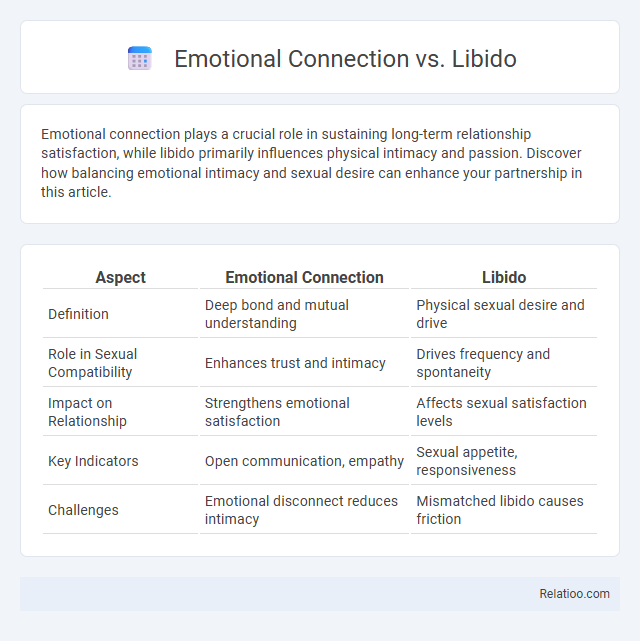Emotional connection plays a crucial role in sustaining long-term relationship satisfaction, while libido primarily influences physical intimacy and passion. Discover how balancing emotional intimacy and sexual desire can enhance your partnership in this article.
Table of Comparison
| Aspect | Emotional Connection | Libido |
|---|---|---|
| Definition | Deep bond and mutual understanding | Physical sexual desire and drive |
| Role in Sexual Compatibility | Enhances trust and intimacy | Drives frequency and spontaneity |
| Impact on Relationship | Strengthens emotional satisfaction | Affects sexual satisfaction levels |
| Key Indicators | Open communication, empathy | Sexual appetite, responsiveness |
| Challenges | Emotional disconnect reduces intimacy | Mismatched libido causes friction |
Understanding Emotional Connection
Understanding emotional connection is crucial for enhancing libido because emotional intimacy often drives sexual desire and satisfaction. Your ability to connect deeply with a partner fosters trust and vulnerability, which directly influences libido levels and overall relationship health. Emotional connection acts as a powerful catalyst, linking psychological well-being to physical desire and making sexual experiences more fulfilling.
Defining Libido and Sexual Desire
Libido, often defined as sexual desire, represents the intrinsic drive or motivation for sexual activity, influenced by biological, psychological, and social factors. Emotional connection, while distinct from libido, significantly impacts your sexual desire by fostering intimacy, trust, and comfort between partners. Understanding the interplay between emotional connection and libido helps clarify the complex nature of human sexuality and enhances relationship satisfaction.
The Science Behind Emotional Bonds
Emotional connection significantly influences libido by activating brain regions associated with pleasure and attachment, such as the ventral tegmental area and caudate nucleus. Your emotional bonds release oxytocin and dopamine, chemicals that enhance intimacy and sexual desire, reinforcing both emotional and physical attraction. Research reveals that strong emotional connections can increase sexual satisfaction and promote long-term relationship stability more effectively than libido alone.
Psychological Factors Influencing Libido
Psychological factors such as stress, anxiety, and depression significantly impact libido by altering brain chemistry and hormonal balance, which reduces sexual desire. Emotional connection strengthens intimacy and trust, often enhancing libido through increased oxytocin and dopamine levels during close interactions. Cognitive distractions and negative self-perception also diminish sexual arousal, illustrating the complex interplay between mental health and sexual motivation.
How Emotional Intimacy Affects Sexual Attraction
Emotional intimacy strengthens sexual attraction by deepening the bond between partners, making physical desire more meaningful and sustained. Your ability to connect emotionally fosters trust and vulnerability, which intensifies libido beyond mere physical impulses. Studies show couples with strong emotional connections report higher satisfaction and increased frequency of sexual activity, highlighting the critical role of emotional intimacy in enhancing overall sexual desire.
Differences Between Emotional and Physical Attraction
Emotional connection involves deep feelings of trust, understanding, and bonding that enhance intimacy beyond physical interaction, while libido primarily reflects your biological sexual desire and drive for physical intimacy. Emotional attraction fosters long-term relationship stability through empathy and shared experiences, whereas physical attraction is driven by sensory stimuli and visual appeal linked to libido. Understanding these distinctions helps you navigate relationship dynamics by recognizing when emotional needs differ from physical urges.
The Role of Communication in Both Realms
Effective communication plays a crucial role in strengthening emotional connection and enhancing libido within intimate relationships. Open dialogue about feelings, desires, and boundaries fosters trust and mutual understanding, which can directly influence both emotional intimacy and sexual desire. Couples who prioritize honest conversations often experience improved relationship satisfaction and a more fulfilling sexual connection.
Navigating Imbalances in Relationships
Emotional connection plays a crucial role in balancing libido within relationships, as a strong bond often enhances physical intimacy and sexual desire. Libido fluctuations can signal underlying emotional or psychological stress, requiring open communication and mutual understanding to restore harmony. Navigating these imbalances involves recognizing the interplay between emotional well-being and sexual health, promoting empathy and tailored approaches to intimacy.
Strategies for Strengthening Both Aspects
Building a strong emotional connection enhances libido by fostering trust and intimacy, key factors in sexual desire. Strategies such as open communication, shared experiences, and emotional vulnerability create a foundation for both emotional bonding and increased physical attraction. Prioritizing regular emotional check-ins alongside maintaining physical affection boosts overall relationship satisfaction and sexual health.
Finding Harmony: Building Fulfilling Relationships
Emotional connection significantly influences libido, creating a foundation where physical desire can thrive harmoniously with emotional intimacy. Your ability to nurture compassion and trust directly enhances relationship satisfaction and sexual fulfillment, leading to more profound bonding experiences. Balancing emotional vulnerability with physical attraction empowers couples to sustain healthy and passionate partnerships over time.

Infographic: Emotional Connection vs Libido
 relatioo.com
relatioo.com